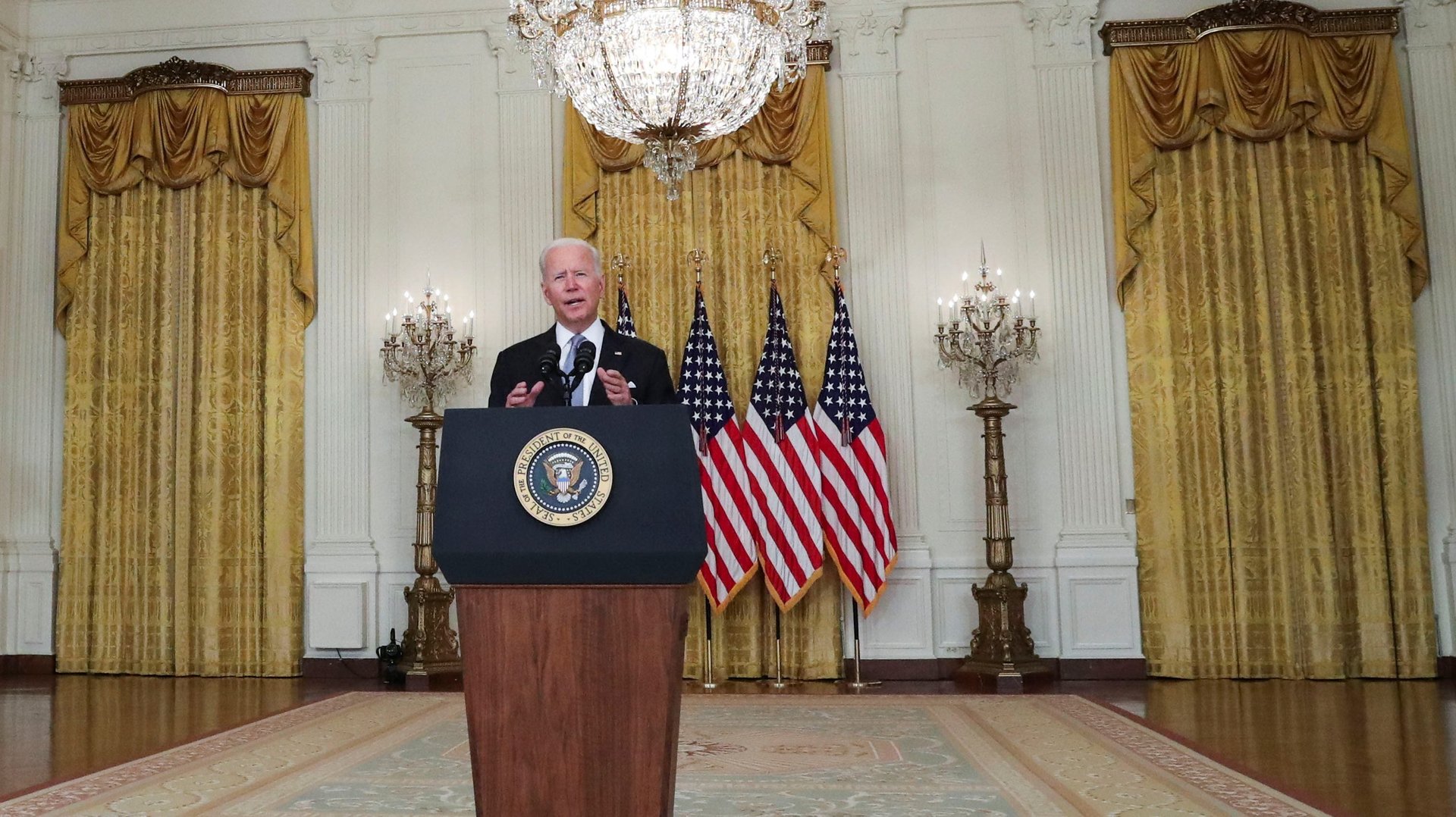How Biden addressed the US withdrawal from Afghanistan
US president Joe Biden spoke from the White House today (Aug. 16) about the crisis unfolding in Afghanistan as a result of the US military’s withdrawal after two decades.


US president Joe Biden spoke from the White House today (Aug. 16) about the crisis unfolding in Afghanistan as a result of the US military’s withdrawal after two decades.
Reiterating many of the arguments he and secretary of state Anthony Blinken have used over the past few days, Biden said he believes to his core that “it is wrong to order American troops to step up when Afghanistan’s own armed forces would not.”
“How many more generations of America’s daughters and sons would you have me send to fight in Afghanistan when Afghan forces will not?” Biden asked. And later: “I would rather take all that criticism than pass this decision onto…yet another US president.”
The US president has come under pressure to articulate a drawdown plan for Afghanistan since announcing in April that US and allied forces would leave the country by the 20th anniversary of 9/11. Critics are calling this week’s evacuation efforts rushed, haphazard, and inadequate for those vulnerable Afghans whom the US had promised to protect.
But Biden was defiant and dismissive of that criticism in his 20-minute address. “I stand squarely behind my decision,” he said. “After 20 years, I learned the hard way that there was never a good time to withdraw US forces. That’s why we’re still there.”
Who are the Taliban?
The Taliban is a “predominantly Pashtun, Islamic fundamentalist group,” according to the US-based Council on Foreign Relations, that after the 2001 US-led invasion of Afghanistan “regrouped across the border in Pakistan and led an insurgency against the US-backed government in Kabul for nearly 20 years.”
In the culmination of that fight, the Taliban marched into Kabul on Aug. 16, 2021. Over the past few weeks, it has conquered every other major city in Afghanistan, as US and NATO forces left the country and Afghan security forces surrendered. From the former presidential palace, the militant group said it would imminently inaugurate an “Islamic emirate of Afghanistan.”
Why is the Taliban taking over Afghanistan?
The US and the UK invaded Afghanistan in 2001. They justified this unilateral move by citing Article 51 of the Charter of the United Nations (pdf), which sets out “the inherent right of individual or collective self-defense” of a country under attack. The Taliban-backed government in Afghanistan supported al-Qaeda after the group planned and executed the 9/11 terrorist attack.
That year, US and allied forces conquered major Taliban strongholds, and by 2003 the US said it was focused on Afghanistan’s reconstruction. But fighting soon resumed, and after Barack Obama became US president in 2008, he committed more troops to Afghanistan. In 2011, the US killed Osama bin Laden, and in 2013 NATO forces (led by the US) officially handed over security responsibility to Afghan military forces. The US military stayed on mostly in a training capacity and for specific counterterrorism efforts.
After a flurry of peace talks during the Trump administration, conversations between the US and the Taliban broke down in 2019, and the Pentagon announced plans to withdraw troops by May of 2021. In his speech, Biden cited that deadline as one reason this week’s events were inevitable.
What did Biden say in his speech about Afghanistan?
In his speech on Aug. 16, Biden said the US accomplished what it came to Afghanistan to do: “Get those who attacked us on 9/11 and make sure al-Qaeda could not use Afghanistan as a base from which to attack us again.” He said it was now time to end the US’ so-called “forever war.”
Biden also seemed to address criticism that the US military either didn’t know or ignored intelligence showing Afghan forces could not withstand a Taliban attack, saying that US intelligence prepared for every contingency, including the current collapse. (Although Biden also said this week moved “faster than expected.”)
“As president, I am adamant that we focus on the threats we face today, in 2021, not yesterday’s threats,” Biden said, pointing to terrorist groups in other countries and competition from China and Russia as examples of what else the US has on its plate. “I will not repeat the mistakes we’ve made in the past.”
Camille Squires contributed.